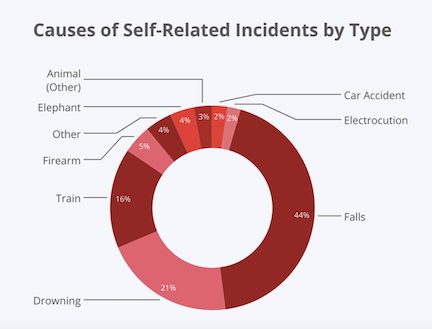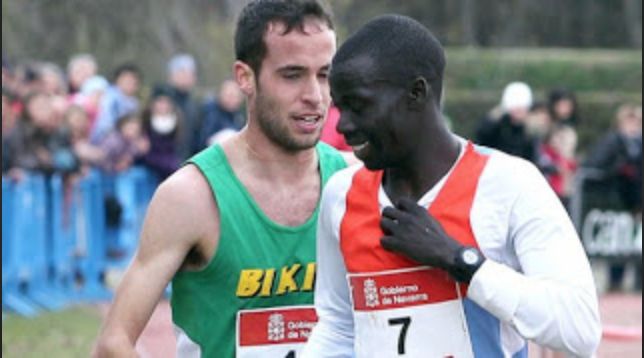Of Selfies and Sacrifice
Czech gymnast Natalie Stichova is just one of the latest of so many to tragically die while attempting to take a selfie. In August 2024 she travelled to the mountains of Bavaria with friends to capture the perfect selfie moment, posed atop the peak the majestic Tegelberg Mountain with the famous Neuschwanstein Castle (the model for Disney's Cinderella castle) spectacularly centered in the background. But this fairytale moment quickly descended into the stuff of horror films when she lost her balance, falling some 250 feet to a tragic end. Though she survived the initial fall, she died 6 days later having never regained consciousness.

According to a comprehensive global study, at least 425 people have died from selfie-related incidents between March 2014 and May 2025, spanning 49 countries. Falling from heights accounts for nearly half of all deaths and injuries. And these statistics represent just the "obvious" or forensically "verifiable" deaths by selfies.
This does not factor in the countless deaths that were peripherally related to taking a selfie or were selfie-related but that could not be verified as such during the autopsy or at the crime scene. Odds are, the number of selfie-related deaths and injuries is likely much higher.

Spiritual self-centeredness is just as dangerous.
According to one commentary:
Looking out for our own interests is natural. In fact, Jesus uses our innate self-interest as a basis for gauging our love for others: “Love your neighbor as yourself” (Mark 12:31). In other words, in the same way that you (naturally) love yourself, learn to love others. Our universe should be others-centric, not self-centric. As Paul puts it, “Do nothing out of selfish ambition or vain conceit. Rather, in humility value others above yourselves, not looking to your own interests but each of you to the interests of the others” (Philippians 2:3–4). This command leaves no room for self-centeredness.
Being focused on oneself usurps the biblical commands to love and care for our neighbors (John 13:34–35), to not pass judgment on others (Romans 14:13), to bear others’ burdens (Galatians 6:2), and to be kind and forgiving (Ephesians 4:32). Being self-centered is directly opposed to the clear command, “No one should seek their own good, but the good of others” (1 Corinthians 10:24). There are many other similar commands calling for selfless sacrifice and service to others (Romans 12:10; Ephesians 5:21; Galatians 5:26).
It concludes:
Every act of self-love is rebellion against the authority of God. Self-centeredness is rooted in one’s fleshly desire to please self more than God. In essence, it is the act of supplanting God’s authority with one’s own ego.
In such conditions, you dangle on the precipice of spiritual demise. Take your eyes off yourself. Step back from the edge. Take off the binders, and turn the lens of your focus to the needs of others!
“No one should seek their own good, but the good of others” (1 Corinthians 10:24, NIV).
"Do nothing from selfish ambition or conceit, but in humility count others more significant than yourselves. Let each of you look not only to his own interests, but also to the interests of others" (Philippians 2:3-4, ESV).
Beauty In Self-denial
Autumn is a most beautiful time of year. But isn't it interesting that the colorful, vibrant beauty of fall foliage stems from the process of dying?
As the season changes, temperatures drop and days get shorter. Trees get less direct sunlight, and the chlorophyll in the leaves breaks down.
The lack of chlorophyll reveals yellow and orange pigments that were already in the leaves but masked during the warmer months. — Smithsonian Sparks

Like the beautiful, "dying" leaves of fall, Christians are most beautiful when they learn to walk in self-denial. It is then that the true vibrance of our walk with Christ shines in greatest contrast to worldly experinece.
When life asks no sacrifice of us, our fullest potential for selflessness lies hidden within, just like the hidden, "colorul" chlorophyll lies masked in the green leaves during the warmth of summer. But through trial, or hardship, or even through times of prosperity, when we place the callings of Christ, and even the needs of others above our own fleshly desires, it is then that the beauty of Christ is best manifest in us and through us.
Then Jesus told his disciples, “If anyone would come after me, let him deny himself and take up his cross and follow me" (Matthew 16:24, NIV).
"I have been crucified with Christ. It is no longer I who live, but Christ who lives in me. And the life I now live in the flesh I live by faith in the Son of God, who loved me and gave himself for me (Galatians 2:20, ESV).
Win or Lose
On December 2, 2012, Spanish athlete Iván Fernández Anaya was competing in a cross-country race in Burlada, Navarre. He was running second, some distance behind race leader Abel Mutai – bronze medalist in the 3,000-meter steeplechase at the London Olympics. As they entered the finishing straight, he saw the Kenyan runner – the certain winner of the race – mistakenly pull up about 10 meters before the finish, thinking he had already crossed the line.
Fernández Anaya quickly caught up with him, but instead of exploiting Mutai’s mistake to speed past and claim an unlikely victory, he stayed behind and, using gestures, guided the Kenyan to the line and let him cross first.
“I didn’t deserve to win it,” says 24-year-old Fernández Anaya. “I did what I had to do. He was the rightful winner. He created a gap that I couldn’t have closed if he hadn’t made a mistake. As soon as I saw he was stopping, I knew I wasn’t going to pass him.”
Fernández Anaya is coached in Vitoria by former Spanish distance runner Martín Fiz in the same place, the Prado Park, where he clocked up kilometers and kilometers of training to become a European marathon champion in 1994 and world marathon champion in 1995.
“It was a very good gesture of honesty,” says Fiz. “A gesture of the kind that isn’t made anymore. Or rather, of the kind that has never been made. A gesture that I myself wouldn’t have made. I certainly would have taken advantage of it to win.”

There are many in this world that have the same perspective as Martin Fiz. They believe the only way to win in life is to be out in front, ahead of those around you. Yet, our Lord, when He was on this earth, taught the exact opposite. He told us things like - the way up is down, the way to the first chair is to take the last chair, the way to live is to die… the way to win is to be willing to lose for others.
Paul took that example and with inspiration wrote the following in Philippians 2: 3-5: "Let nothing be done through strife or vainglory; but in lowliness of mind let each esteem others better than themselves. Look not every man on his own things, but every man also on the things of others. Let this mind be in you, which was also in Christ Jesus."
Winning in this world is climbing up the ladder of success. But as you are going up, never forget that our Savior found victory by coming down.